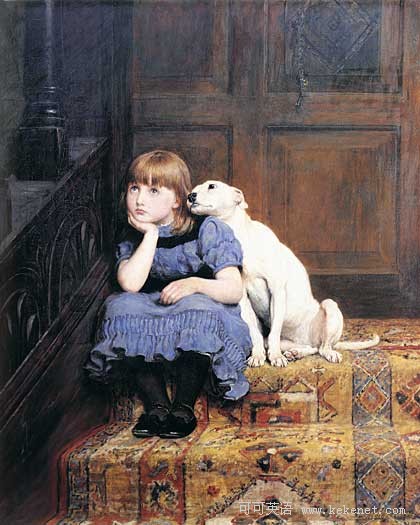(单词翻译:单击)
英文原文

【英文原文】
Julie was eight when I first came across her as a psychotherapist. She was silent, refusing to disclose anything about her life at home. I had a sense of her profound hunger as she touched every toy and pressed the dolls into her face in intense embrace. Then she disappeared.
Four years later, when I founded Kids Company, a children's charity, I heard a child screaming at the gate. It was Julie. She was now the carer of her three younger siblings. Her mum and dad did drugs and crime. The children looked hungry, gaunt, dishevelled, and yet Julie was glowing beneath the dirt.
They hadn't been in school since she'd disappeared. Within a month of being with us, her father was imprisoned, leaving her mum without the drugs she needed. She forced Julie into prostitution, pimping her to facilitate her addiction. Julie hid food so she could feed her younger siblings. At night, Julie would shelter her siblings in her bed, while drug-dealers squirted blood on to the walls. One day the police raided the house. Her favourite dog jumped to protect her, and they blew his brains out in front of the kids.
After a year and a half of Kids Company's relentless advocacy, the three siblings were taken into care. Julie was left, negotiating the traumas of her childhood. But here's the rub: 10 years later, she is inspirational. She looks out for the vulnerable children on her estate. She fights for them with breath-taking thoughtfulness. Born into such moral corruption, how did she get to be so ethically extraordinary? And what did Julie know from such a young age that all of us could learn from?
I think Julie discovered something very precious. She understood, early on, that she needed to diminish her own sense of importance so the needs of her younger siblings could be met. The kinder she became, the more energy she accessed. The reward of seeing how potent her compassion was enabled Julie to rise above the victim-position her abusers endeavoured to trap her in. As much as she was harmed, physically and emotionally, they could never corrupt her, because she operated through higher principles of humanity.
I don't want to romanticise her story. Lack of maternal love and the blows from her parents' fists have left Julie with challenges. She is often hyper-agitated. When the bank clerk tells her she has no money she sobs, like a child who's been hurled back into the catastrophic burden of having no food to feed her siblings. Sometimes her sleep is invaded by memories of the sexual assaults she has tolerated.
She could have said: "Life's not worth living, what's the point?" She could have been cruel in revenge for the harm she had experienced. She could have run away . She could have taken her own life. Instead, she aspired towards life. Something made it worth living. It gave her courage, afforded her resilience, channelled her rage and helped her more than "survive".
I believe the capacity to be ethical becomes accessible to human beings when they shed their consumerist skin, when they peel away the layers of defensive achievement, hurrying to get degrees, promotions, money. When you shed this, you become at one with the intuitive laws through which all things alive are organised. At this point of fusion with the greatness beyond "I", people get a glimpse of the essence of all important things. Jung called them "archetypes", the peeled-away fundamentals of life.
Traumatised children often have a unique access into this spiritual dimension. They know intrinsically the fragility of being a person. Julie certainly knew how catastrophic her smallness was. However, she also discovered the space where the rottenness of abuse could not reach her. The space she discovered was a byproduct of her ability to express compassion. Her sense of agency, and her power to fight, came from knowing she could access the unrelenting love that came from just being kind. It's not a bargain or an exchange. It's embodying an expression of the spiritual. I think that's why Julie glowed beneath the dirt. And despite it.
The government has to have the courage to care for the vulnerable without agenda – just for the love of accessing good. This will begin the process of healing, helping the nation rebalance its "emotional economy". The human condition is only meaningful in the expression of love and care for another. Julie knew how to get out of her hell. There is so much we could all learn from her.
中文译文
【中文译文】
我第一次见到朱莉是她八岁那年,那时我是一个心理医生。她很沉默,拒绝透露所有关于她在家里的生活情况。当她抚摸每一个玩具,并把娃娃紧紧地贴在脸上时,我感到她有一种强烈的渴望。之后,她就音信全无。
四年后,我成立了一家名为儿童公司的儿童慈善组织,某天我听到了门口有孩子的尖叫声。是朱莉。她现在照顾着三个年幼的兄弟姐妹。她父母吸毒、犯罪。这些孩子看起来饿坏了,骨瘦如柴,蓬头垢面,但朱莉却出淤泥而不染。
她消失之后,弟妹就不再上学。和我们待了一个月后,她父亲出狱了,她母亲也没有了毒品的来源。她便强迫朱莉卖淫,为朱莉拉皮条来满足她的毒瘾。朱莉藏了一些食物,这样她可以养活她的弟妹们。晚上,当毒品贩子来家捣乱,往墙上泼血时,她会保护她的弟妹们。她最喜爱的狗狗跳出来保护她时,毒品贩子当着孩子们的面打爆了它的脑袋。
经过儿童公司一年半的不懈支持,三个弟妹都受到了很好的照顾。朱莉被留了下来,和我们谈谈她的童年创伤。问题在于,10年之后,她给了我们无穷的启发。她在家照顾更弱小的孩子。出生在道德沦丧的家庭里,为何她有如此高尚的情操?朱莉这么小的年纪是如何了解到我们都应该学习的道理?
我想朱莉发现了一些十分珍贵的东西。她很早就了解到她需要打消自身的重要感,这样就可以满足她弟妹的需求。她越亲切善良,她就越有活力。想看看怜悯之心会有怎样强大的回报使得朱莉摆脱了受害者的角色,而这个受害者的角色是施虐者竭力设计的。尽管她身心受伤,但是他们不可能使他堕落,因为她遵循着更高的人性的准则。
我不想夸大她的故事。缺少母爱,吃尽父母的拳打脚踢之苦,使得朱莉面临许多挑战。她常常过于焦虑。银行职员告诉她她没有钱时她就啜泣起来,就像一个孩子又陷入无法养活自己的手足的悲惨压力中。有时候,过去她所忍受的性侵犯的梦魇又会侵扰她的甜梦。
她本可以说:“人生不值得活下去?生活的意义在哪里?”她本来可能因为她所经历的伤害而进行残酷的报复。她本来也许会自我了断。相反地,她却对生活充满了企望。总有一些东西让生活值得一过。这给了她勇气,赋予了她韧性,舒缓了她的戾气,帮助她不仅生存了下来,更要生活下去。
我相信当人脱下消费主义者的皮囊,卸下追求功名利禄的盔甲,拥有道德的能力会让我们更具人性。当你卸下这些外在之物后,你会成为一个由直觉规律支配的人,这也是世间万物有序存在的规律。此刻,若融合了超越”自我”的伟大感,人们才会窥察到所有重要事物的本质。荣格称之为原型,也就是剔除外物的生命的本质。
受过创伤的儿童常常会有进入这个精神层面的独特方式。他们生来就知道人类的脆弱。朱莉当然明白自己的渺小是多么的悲惨,她同时也发现了一个龌龊的虐待不可能伤害她的空间。她所发现的这个空间是她抒发怜悯之情的副产品。她的力量感,她的反抗力来自于她笃信只要善良就会产生坚韧的爱。这不是讨价还价或是一种交易。这体现了一种精神诉求。我想这也是为何朱莉能出淤泥而不染的原因。尽管她身处这样的环境之中。
政府应该有勇气无私地关心弱势群体,仅仅是出于向善的爱。应该从疗愈过程开始,帮助国家重新找回“情感经济”的平衡。人类只有在互爱互助的表达中才有意义。朱莉知道如何将自己从深渊中拯救出来。这也是我们能从她身上学习到的所有东西。


